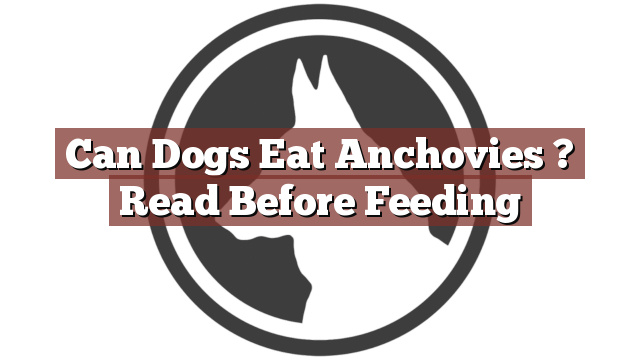Understanding Your Dog’s Dietary Needs
As a responsible pet owner, it is essential to understand your dog’s dietary needs to ensure their overall health and well-being. Providing a balanced diet with the right nutrients is crucial for their growth, energy levels, and maintaining a healthy weight. While dogs primarily thrive on a diet that consists of meat, some human foods can be incorporated into their meals in moderation. However, not all human foods are safe for dogs, and it is important to educate ourselves about what they can and cannot eat.
Can Dogs Eat Anchovies? Read Before Feeding
Can dogs eat anchovies? This is a common question that dog owners may have when considering adding variety to their pet’s diet. The answer is yes, dogs can eat anchovies, but it should be done with caution and in moderation. Anchovies are small, oily fish that are packed with omega-3 fatty acids, protein, and other essential nutrients. These nutrients can contribute to your dog’s overall health and provide numerous benefits, including a shiny coat, improved heart health, and reduced inflammation.
Pros and Cons of Feeding Anchovies to Dogs
Feeding anchovies to your dog has its pros and cons. On the positive side, the omega-3 fatty acids found in anchovies can have anti-inflammatory properties, benefiting dogs with joint issues or allergies. Additionally, the high protein content in these tiny fish can support your dog’s muscle development and repair. Anchovies also contain vitamins and minerals like calcium, iron, and magnesium, which are essential for your dog’s overall well-being.
However, it is important to note that anchovies are also high in sodium. A diet high in sodium can lead to health complications in dogs, such as increased blood pressure or kidney problems. Therefore, it is crucial to feed anchovies to your dog in moderation, considering their overall sodium intake from other sources as well. Furthermore, always remember to remove the bones from anchovies before feeding them to your dog, as they can pose a choking hazard or cause digestive issues.
In Conclusion: Consider Anchovies as a Treat, Not a Staple in Your Dog’s Diet
In conclusion, while dogs can eat anchovies, it is important to consider them as a treat rather than a staple in their diet. The omega-3 fatty acids and other nutrients found in anchovies can provide various health benefits for your furry friend. However, due to their high sodium content, feeding anchovies should be done in moderation and with careful consideration of your dog’s overall diet. As always, it is recommended to consult with your veterinarian before introducing any new food to your dog’s diet, especially if they have any pre-existing health conditions. By understanding your dog’s dietary needs and making informed choices, you can ensure their well-being and happiness for years to come.
Thank you for taking the time to read through our exploration of [page_title]. As every dog lover knows, our furry friends have unique dietary needs and responses, often varying from one canine to another. This is why it's paramount to approach any changes in their diet with caution and knowledge.
Before introducing any new treats or making alterations to your dog's diet based on our insights, it's crucial to consult with a veterinarian about [page_title]. Their expertise ensures that the choices you make are well-suited to your particular pet's health and well-being.
Even seemingly harmless foods can sometimes lead to allergic reactions or digestive issues, which is why monitoring your dog after introducing any new food item is essential.
The content provided here on [page_title] is crafted with care, thorough research, and a genuine love for dogs. Nevertheless, it serves as a general guideline and should not be considered a substitute for professional veterinary advice.
Always prioritize the expert insights of your veterinarian, and remember that the health and happiness of your furry companion come first.
May your journey with your pet continue to be filled with joy, love, and safe culinary adventures. Happy reading, and even happier snacking for your canine friend!

